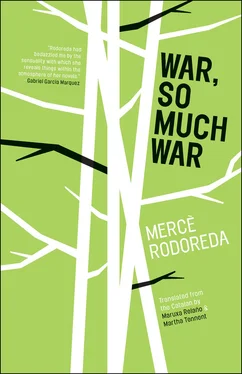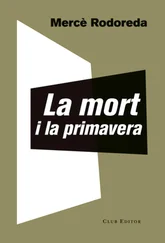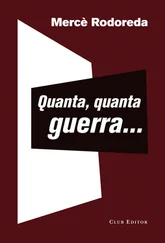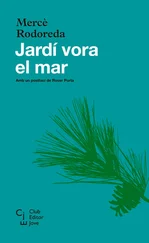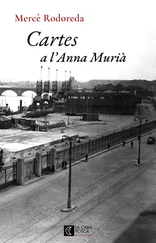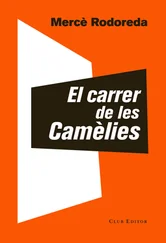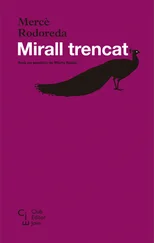XIX WHAT I SHOULD HAVE SAID
I SHOULD HAVE SHAKEN HER, GIVEN HER A GOOD SHAKE AS I shouted idiot, you idiot, why such desire to die when you have your whole life ahead of you? We lead our lives, all of us, without knowing what awaits us, but the more time you have before you, the greater the hope. It is a fresh life that turns the corner of every new year, and the year that commences might be one of cream or of honey, and then it ends, and the next one is different. I’ve known this since I was a boy: after sorrow, joy. I should have urged her to try to remember the world as it was in the beginning, when none of us knew we had bones, or what they were meant for, or what a worm was for, or the eagle that flies, or the leaf that detaches from the branch unweeping, unlike a human being would if he should fall like that, because the leaf knows, it carries this knowledge in its leaf-blood, that in the spring it will again be a leaf; its spirit will have slipped through the roots of the tree and up the trunk until it again breathes the winds of the rose. Rose under the sun, the rose will again become a rose. Believe me, I know better than anyone: rose when the dew. . No, when the morning light on the dew. . No, when the dew born of the damp night still. . No, when the dew on leaves of grass still. . To want to know the logic of death, whose purpose is to remove people from this world. . there are too many of them. Out, out, out with you. Do not weep, do not wish to die. I was not made for the things you yearn for. I was meant to roam the world. Do not search for death, He will come to you. A good whipping! That’s what I should have given you instead of listening to you babble. You who had all the time in the world to keep Death waiting, with the joy of living, with the taste of apples and pears, of pomegranates with their queenly royal crown that appears when their curly leaves fall and the crown emerges sealing the hard green round box filled with diamonds as red as the blood when you cut yourself and a drop of fire appears like a pomegranate kernel with its wooden seed the color of your lips, not the seed, but the leaves of the flower pursued by the winds so that the tender crown may flaunt itself. That is how it should be: flaunt your tender crown, you who wanted to give your life to the water, a yellow butterfly in your hair. And when you marched into the waves, I should have grabbed you and dragged you to the sand and thrashed you till you were numb, and when you recovered you would no longer have wished to die, for it is true that a good thrashing expunges much sorrow. Do you hear me? I’m mad with rage because you have forced me to think about you and feel the weight of guilt for a death that you alone have chosen. I was at peace and you have thrust upon me the affliction of madness. Isabel.
Lying facedown, arms crossed, head resting on my arms, that person in front of me — that I that was and was not me — moaned: Go home. Mother and I are in the midst of planting cuttings of white carnations for First Communion bouquets and children’s funerals. And with a small thread of a voice that mocked me, she cried, my name is Isabel.
XX THE WOMAN WITH THE CANARY
I WOULD HAVE WEPT HAD I NOT HEARD THE RINGING OF A LITTLE bell approaching. Had I not glimpsed that moving light among the pine trees, coming from the same direction as the sound of the bell. Not until I had her in front of me did I see that it was an old woman carrying a lantern. She stood there, dressed in black, a black scarf around her head. She was holding the lantern, which she placed on the ground, and an umbrella. Hiding behind her was a little boy with a birdcage, a little bell inside it. Are you wounded? asked the old woman. No. She had the same face as my godmother Antònia: a long, lumpy nose, small, calm eyes, a mouth like a slit made by a knife. I hadn’t thought of her for many years because she had died a long time ago. I could picture her seated on the bench in the entranceway, watching me make mud pies, occasionally saying to my mother, poor thing, with no husband. I pictured her doing the laundry, tucking me in at night, all gentleness and sweet words as she explained to me that feathery animals were angels disguised as woodcocks or partridges, but they had to be killed like pigeons in order for us to eat them and, with every bite, become winged angels, and she would wave her hand up and down — onward, onward — like the flapping of wings. When we can, the girls in the village and I go to the castle to care for the wounded, the old woman said. The little boy set the cage down beside the lantern, it’s a canary, he said. It was green, it jumped from perch to perch, and with each jump the little bell rang. The bell keeps him happy and helps him sing. I’m surprised you’re not wounded; all the boys and men I come across who are lost like you have some wound or other. The ones who are in the worst shape are taken to the castle. The old woman had such a hoarse voice that it troubled me. If you were wounded I would send someone for you and have you taken to the castle. I was on the point of yelling that, no, I was not wounded. Did you know there is a poor man at the castle who is coming to his end? He used to have seven canaries. Of the seven only one sang. If only I could hear it, he said when I told him I had a green canary. I promised him I would take it to him today, and I am; but it might be too late. Dead. Most of them die in the early morning. If only I could hear your canary, Senyora Isabel — my name is Isabel — I could believe that mine had not died in that terrible bombing, buried beneath the rubble while I was down at the docks, unloading. She paused and held the lantern closer to me. You can’t fool me. You’re ill. Your face is paler than cream and your eyes red from weeping. I have never wept, I told her, not even when I was little. Something inside me always grabbed hold of my tears and wouldn’t let them out. If you don’t need me, she said, I’ll be on my way to the castle. The first thing I’ll do is go see the baron, who went batty when his brother died with his knees shattered by blows from a rifle butt. He keeps himself locked in the flag room. She picked up the lantern and the umbrella from the ground. The little boy took the cage and dragged it along. As soon as they left it started to rain. And through the turbulence of the waves I could hear the little bell ringing.
I COULD ALREADY SEE THE LIGHTS OF A VILLAGE WHEN I NOTICED an isolated house with its second-floor balcony all lit up. Drenched, seeking a place to shelter more than anything else, I entered the garden by jumping over the low wall that enclosed it. I found refuge beneath the balcony, but the wind was driving the torrential rain against me; I searched and searched until I found an unlocked door. The smell did not lie: I had entered the kitchen. I groped around and came across a hanging bag from which I extracted a piece of bread. If I could only find the salt and the cruet of olive oil. . My mouth was beginning to water, while outside the lighting and thunder and clamoring sea locked in a fierce tempest. Footsteps coming from the garden suddenly transformed into a silhouette in the doorway; the door swung inward against me as the shadow reached in to switch on the light. How I wished the ground could have swallowed me up. A man in a trench coat dripping with water — he was clearly the owner — stood there calmly looking at me. Without a word he opened a small cupboard and brought out a plate of sliced ham. If you’re hungry, eat. I see you’ve found the bread. My hunger vanished on the spot. He was neither old nor young, ageless almost. He had a high forehead — it seemed to never end — and cheeks covered with dry, dead skin. His perfectly aligned teeth were green. The look he gave me seemed to come from deep within; it was as if he were returning from another world, and encountering the real world pained him. He had a gold clover pinned to his tie. I gave him the same story: the soldiers, the war, losing my way. You certainly look lost. He said I could spend the night. There’s an extra room upstairs. He helped me light a fire. The rain buffeted the roof, claps of thunder crawled in the distance; yet the storm was fleeing. I lay down on the floor with the bedspread for a mattress. I wanted to be near the hearth. My clothes were drying on the back of a chair. I could hear water dripping on the tin roof. The crackling of the fire lulled me to sleep. I was enveloped by a sense of peace that cannot be explained. . By the low wall over which I had jumped, a boy who looked like me was blowing soap bubbles with a cane that he periodically dipped in a tin can; the bubbles hovered above a drowned girl whose body was being swept in and out by the waves. A hazy figure clutched at the bubbles that did not burst and tossed them into the air as if they were oranges, mumbling something about a vegetable patch with turnips and carrots. Many of the bubbles turned into human heads that floated upward gazing at the sky. They surged and sank with the breathing of the sea. Death, with green teeth, sat on the belly of a cloud. Seven women with feet of gold huddled together blowing seven long trumpets that spewed bubbles into the sea, while Death’s scythe awaited the order to begin reaping the floating heads. . I awoke drenched in sweat. A woman’s husky voice on the other side of the door was calling me to come down to breakfast.
Читать дальше
